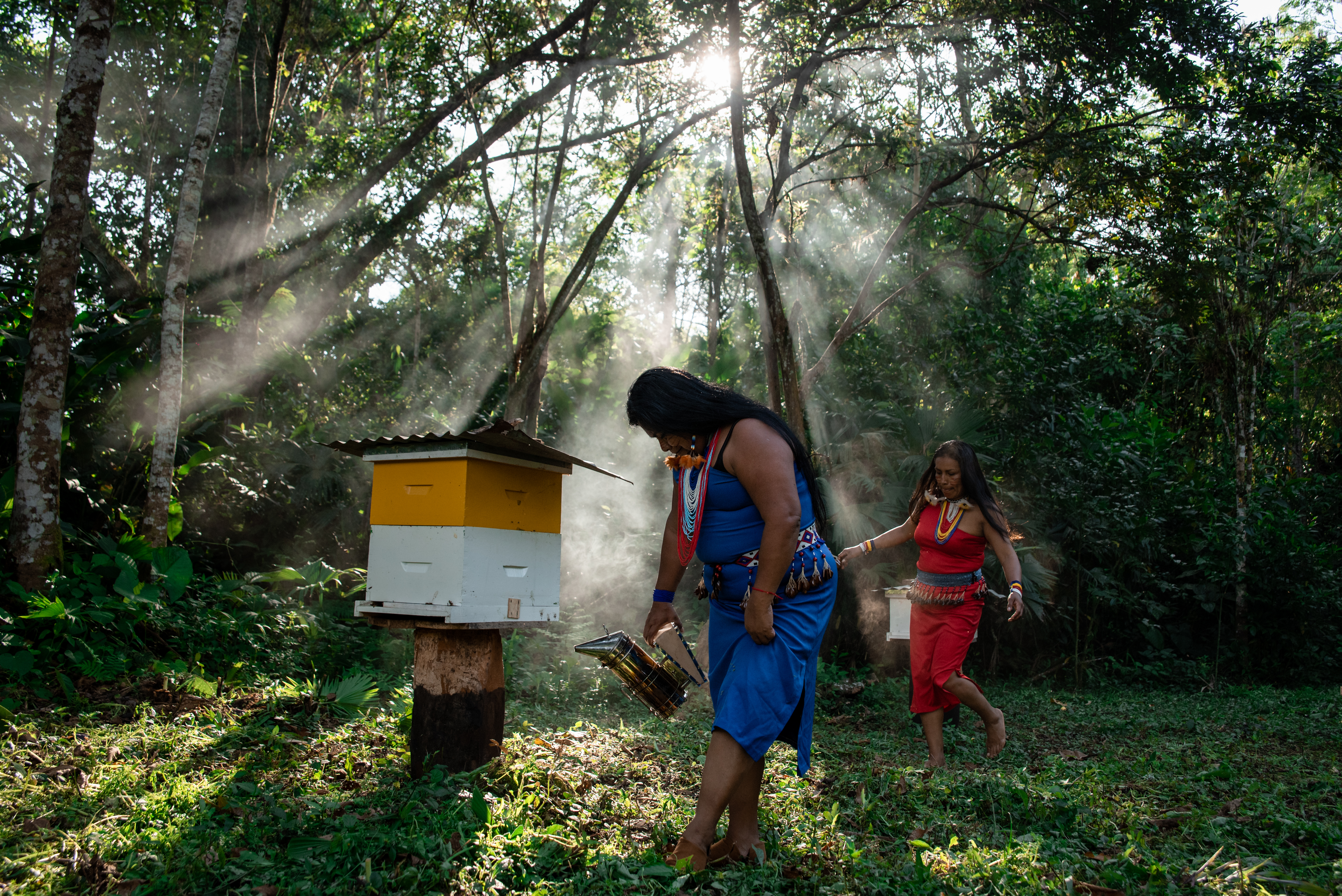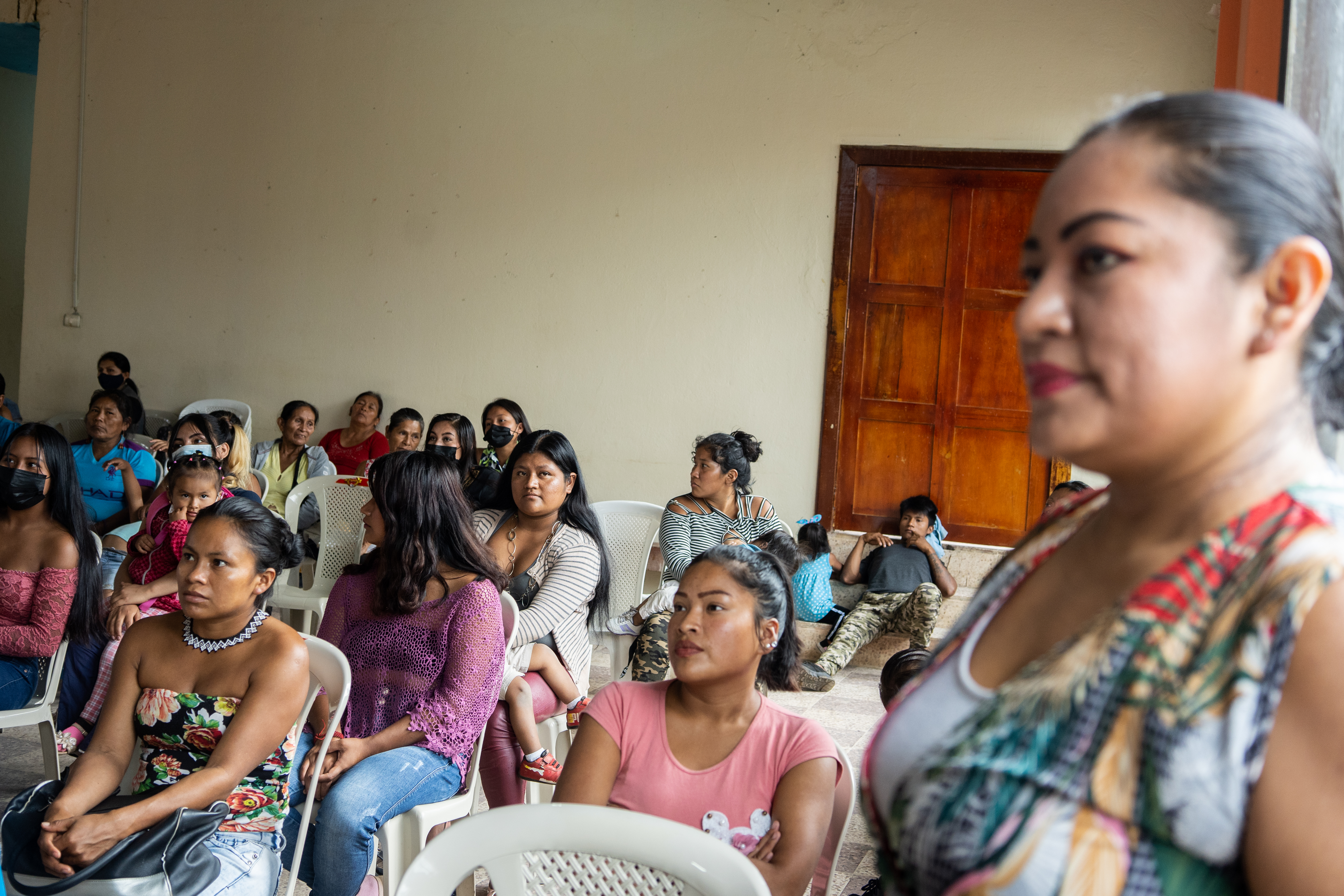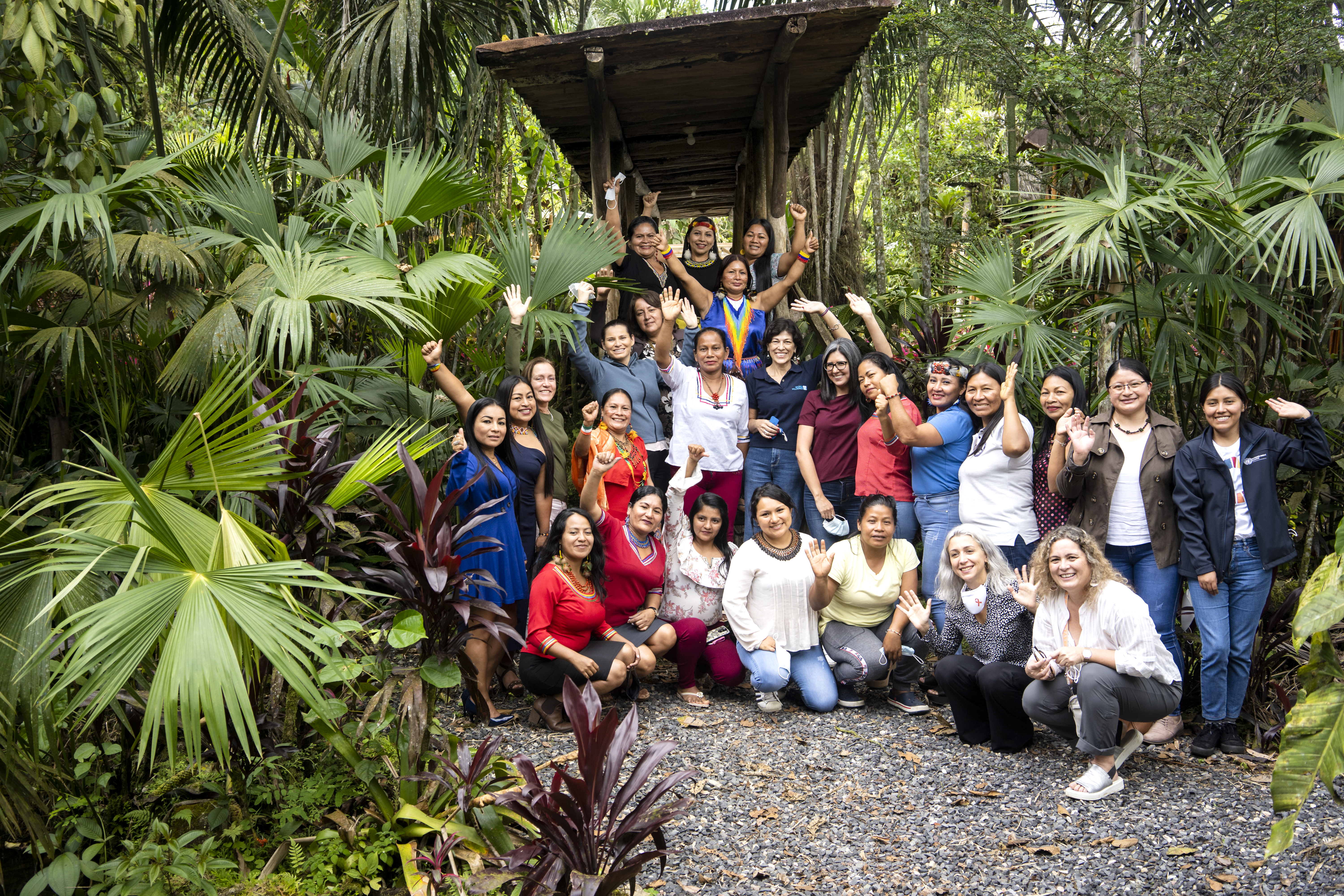| To date, ten PDOTs and five PUGs (land use planning instruments with a gender perspective) have been approved in ten Amazonian towns: Orellana, Shushufindi, Dayuma, Limoncocha, Morona, Sevilla Don Bosco, Macuma, Taisha, Nangaritza y Zurmi. |
Amazonian women, leadership, and autonomy in the face of Ecuador's climate crisis
Date:
In Ecuador, rural women, especially Amazonian women, maintain a close relationship with their territory and are leaders in environmental conservation. Gender inequality is one of their most significant challenges, reflected in their limited access to natural and economic resources. With the aim of reducing inequalities, in Ecuador, UN Women developed a project focused on improving the situation and position of Amazonian women in socio-environmental processes, promoting the conservation of biodiversity, forests, and ecosystem services, as well as in production processes to address climate change.

Coordinated actions to protect the environment
In the Amazon, the main economic activities of rural women are agriculture and livestock raising. They till the land and ensure food security for their populations. Despite being so productive, in rural areas, these women suffer disproportionately from the multiple aspects of poverty and are more exposed to climate change. In Ecuador, 35.5% of rural women live in poverty, compared to 15.5% of the national average (UN Women-PROAmazonia, 2019).
To reduce gender gaps and achieve the full participation of rural women, especially Amazonian women, The PROAmazonía programme considers it essential to incorporate a gender approach in governance, environmental incentives, and sustainable practices to reduce deforestation and forest degradation in the areas of intervention of the program.
UN Women, through the project "Incorporation of the gender approach in the PROAmazonia programme", works in partnership with other agencies of the United Nations System, government entities, and civil society to improve the situation and position of Amazonian women in socio-environmental processes, promoting the conservation of biodiversity, forests and ecosystem services, as well as in production processes to address climate change. The project operates territorially in the cantons and parishes with Global Environment Facility (GEF) processes in the provinces of Sucumbíos, Orellana, Morona Santiago, and Zamora Chinchipe.
UN Women actions for the incorporation of the gender approach
The integration of a gender perspective in the design, formulation and implementation of programs and policies focused on climate change makes it possible to generate effective actions that place women and girls at the center of decision-making, both in policy and in response and recovery mechanisms, so that they are effective and prevent further environmental degradation and an increase in existing gaps.
The PROAmazonia programme has four components: Policies and Institutionality; Transition to Sustainable Production Systems; Sustainable Forest Management, Conservation and Restoration; and REDD+ Operationalization and Financing.
UN Women has supported each of these components so that the project has a validated methodology for intervention, from a gender perspective with intercultural relevance, to promote the conservation of biodiversity, forests, and ecosystem services and also improve practices in the processes of mitigation and adaptation to the effects of climate change.
Gender approach from a policy perspective

To address the effects of climate change on women and girls, policies must be developed to ensure that women play a crucial role in developing public policies that take into account their needs.
UN Women has worked directly in the territories where the project is implemented and, together with the technical teams of local governments, has supported the construction of Territorial Development Plans (PDOTs) to incorporate the gender perspective, thus influencing local public policy.
One of the examples of these actions is the increased participation of women in the canton of Nangaritza, which now has a proposed regulation to the Ordinance of the Citizen Participation system with contributions from civil society from a gender perspective.
"Activities have been promoted to strengthen participation. The changes have taken place little by little. It has been complicated to gain political and organizational spaces; therefore, what UN Women promotes is of great support for us in the council. By having tools such as the PDOT, we have a legal framework for public policy, which allows us to move forward faster," says Maritza Rodríguez, president of the Gender Commission and councilwoman of Nangaritza.
Finally, to ground public policy in cantons and parishes, UN Women took part in the construction of 25 proposals for Ordinances and 25 proposals for Resolutions with a gender mainstreaming approach - all these instruments within the framework of sustainable production and environmental protection.
Economic Empowerment and Financial Inclusion for Sustainable Development
Women's participation is fundamental in climate change adaptation and mitigation. For this reason, UN Women, as part of the PROAmazonia programme, supports incorporating the gender perspective with cultural relevance in socio-environmental processes involving the management of natural resources through bio-enterprises and value chains.
Women are present in associative productive processes, but do not participate equally in decision-making, which has prevented them from achieving full economic autonomy. Through workshops, UN Women has strengthened the incorporation of the gender approach in the associative processes of producer organizations so that women are present in the production and marketing processes.
"The involvement of women in our association was almost nil. Through the workshops we identified this problem and understood that our participation is crucial, so we modified one of the requirements for joining the association. Before, only holders of hectares with palm hearts could participate, and all the deeds were in the name of men; now, this is no longer a requirement, we are more women, and we are on the board of directors, making decisions," says Giomara Pineda, secretary of the Association of Palm Growers of the Ecuadorian Amazon (APAE), which is part of the program.
UN Women has also developed a methodology and tools for mainstreaming a gender perspective in conservation processes.
Participation for the future: Escuela Antisuyu Warmikuna

Strengthening the capacities of Amazonian women is a fundamental measure to reduce the existing gender gaps in this region of the country. That is why the Antisuyu Warmikuna School was created to strengthen women's management and leadership capacity of the indigenous nationalities of the Ecuadorian Amazon.
Since 2019, the school has received several indigenous women leaders from the Amazon who seek to strengthen their skills and knowledge on topics such as gender equality, women's rights, leadership and organization, climate change, financial inclusion, among other important topics for their personal and economic empowerment, as well as their fundamental contribution to the development of the people of their communities in harmony with their environment.
Since the school began its activities, women from more than 56 Amazonian communities, belonging to 11 nationalities, have passed through its classrooms. Although the pandemic forced them to rethink a new way of teaching at a distance and in small groups, this did not prevent them from continuing with their training, but rather strengthened the sense of belonging on the part of the students, who see this school as a space for sharing among women and their peers.
One of the fundamental pillars of the school is the power of replication; that is, that the women who attend can share the knowledge acquired during the training with other women in their communities.
"The school gives us the opportunity to open the way for more indigenous women to demand their rights so that they can strengthen their capacities and participate in decision-making in their communities," says Jiyunt Uyunkar, an indigenous leader of the Achuar nationality in the province of Morona Santiago.
Voices from the Amazon: Amazon Women's Agenda
Ensuring women's participation and leadership is crucial to improving policies and programs to reduce inequalities, climate change, the environment, and disaster risk reduction.
Within the framework of the project, UN Women promotes the construction of the Amazon Women's Agenda, an organizational instrument created collectively to gather the demands and situations of indigenous women in the Amazon and establish a plan to overcome them. The plan has been developed with the voices of women leaders from the 11 indigenous nationalities, who actively participated in elaborating the methodology for the development of the agenda to ensure high participation of indigenous women in its construction.
Transcendence for a sustainable future
To ensure the project's long-term impact, UN Women has trained the technical staff of the institutions that make up the PROAmazonia programme in gender issues. In this process, the "Methodology and Toolbox to strengthen gender mainstreaming in the implementation of bio business projects of the Competitive Fund" was developed, an instrument aimed at supporting organizations implementing bio businesses and that can also be applied by other organizations interested in contributing to gender equality in climate change mitigation actions. The Toolbox consists of four modules and is designed so that it can be applied in any future project.
The programme highlights the fundamental role of rural and indigenous women in shaping a sustainable future through environmental conservation, climate change adaptation and mitigation, and disaster risk reduction in Ecuador.
Ecuador is one of the most megadiverse countries in the world. Its natural and cultural wealth has allowed the state to commit to conserving biodiversity and natural resources. As a measure to curb and mitigate the impacts of climate change in the country, the Ministry of Environment, Water and Ecological Transition (MAATE) and the Ministry of Agriculture and Livestock (MAG), with the support of the United Nations Development Programme (UNDP), developed the Comprehensive Amazonian Program for Forest Conservation and Sustainable Production, PROAmazonía. The programme is financed with non-reimbursable funds from the Green Climate Fund (GCF) and the Global Environment Facility (GEF). It seeks to reduce deforestation and forest degradation through the conservation and sustainable management of this resource.